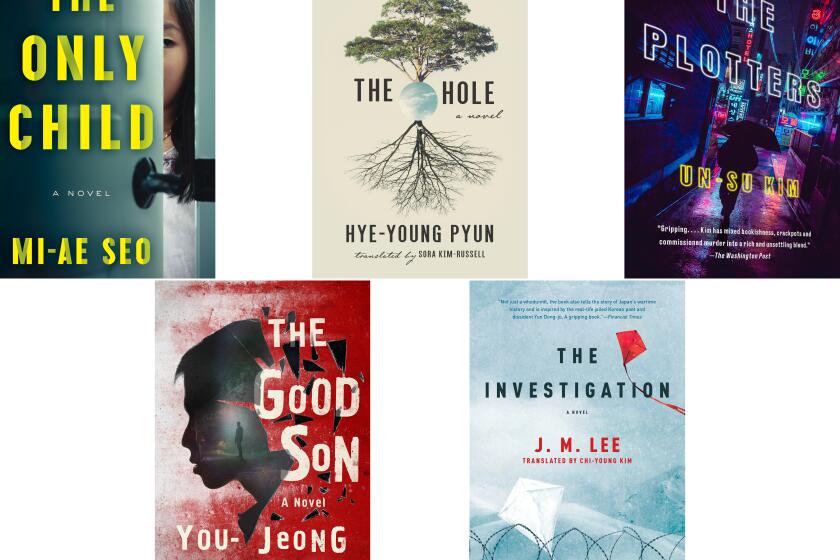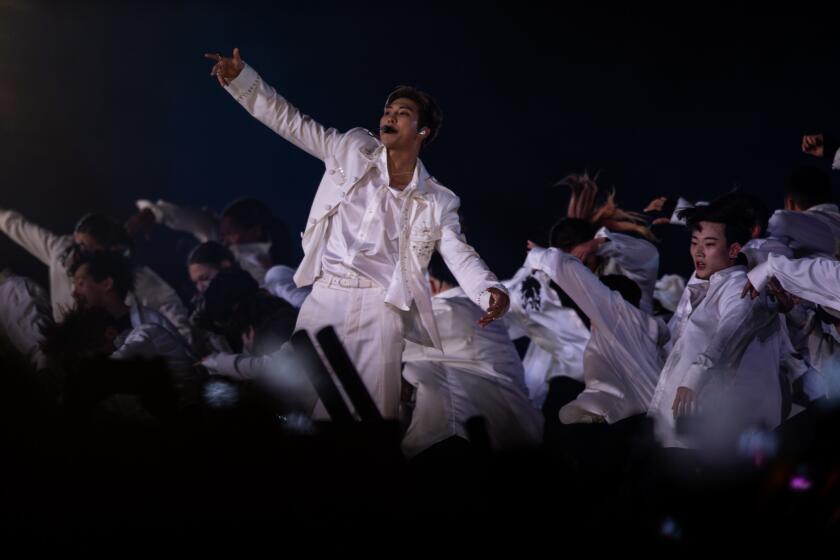Review: Another deep dive into dark minds from a masterful Korean author
You-Jeong Jeong is a certified international phenomenon; her psychological thrillers have sold nearly 2 million copies in her native South Korea and has been published in 19 other countries. And yet we Americans are still playing catch up: “The Good Son,” her fifth novel, was published in the U.S. just two years ago, to a chorus of exclamations over this supposedly fresh discovery. That Jeong has actually been at the top of her game for a long time is abundantly evident from “Seven Years of Darkness,” published in Korea in 2011, which follows in translation this month.
Jeong’s third novel, “Seven Years” seems straightforward at first, with few hints of the complexities to come. Choi Sowon was only 11 in 2004 when his father, Choi Hyonsu, the new head of security at Seryong Dam, was charged by police with a brutal crime and a heinous cover-up: He allegedly murdered an 11-year-old girl and then, two weeks later, opened the dam’s floodgates, destroying most of Seryong Village and drowning not only the girl’s father and four policemen but his own wife, Sowon’s mother.
As Hyonsu’s case wends its way through the courts, young Sowon spends the next seven years in a heartbreaking shuffle among relatives, none of whom keep him for more than a few months before whispers over Hyonsu’s crimes force another expulsion, deepening the boy’s shame and hatred for his father, a former pro baseball player he once adored.
Five authors of Korean thrillers you should be reading: You-Jeong Jeong, Un-Su Kim, Young-Ha Kim, J.M. Lee and Hye-Young Pyun
Desperate, Sowon reaches out to Mr. Ahn, a former security guard at the dam who roomed with the Choi family and tried to protect the boy on the night of the crime. A struggling ghostwriter and deep-sea diver, Ahn takes the 18-year-old under his wing and teaches him to dive. But as Sowon settles into his new life, someone sends him a salacious magazine article about the scandal, provoking a violent reaction that sends Sowon to court. To protect Sowon from juvenile detention, Mr. Ahn settles with the victim, which forces the pair to move to cheaper lodging in a sub-basement studio. Dogged by repeated mailings of the same article to their new landlord, Sowon’s schools and their neighbors, they finally flee for the blissful anonymity of Lighthouse Village, in a remote corner of the Hwawon Peninsula.
“They say a cat can sense thunder right before it rumbles,” Sowon writes of that time. “Perhaps the human brain has a similar sensory ability — the clock of anxiety that begins ticking when catastrophe looms.” Catastrophe comes in the form of a diving accident that tips off the police to Sowon’s whereabouts. Instead of consoling the teen and plotting their next move, Mr. Ahn disappears. The next day, a manuscript titled “Seryong Lake” arrives for Sowon via courier. It’s Mr. Ahn’s fictionalized account of the events surrounding the murder and the Seryong Lake disaster.
The embedded-story trope is nothing new. Hamlet’s play within the play, designed to expose his father’s killer, comes to mind, as does Ian McEwan’s 2001 novel, “Atonement,” in which a writer attempts to make amends for a damaging lie through her fiction. Here too the nested novel, “Seryong Lake,” aims to expose truths: the power of the murdered girl’s father, Oh Yongje, a dentist and major owner of property around the lake; Yongje’s wife’s struggle to escape his abuses; and the intensity of Mr. Ahn’s writer’s block. Also rendered in detail are Sowon’s father’s alcoholism, his mother’s difficult climb out of childhood poverty and finally the dreamy young boy Sowon once was, before it all became a distant memory.
As Mr. Ahn’s story prods Sowon’s memory, questions mount for him and the reader: Does Ahn really know these family secrets, or is he exploiting Sowon’s trust in him to write a breakthrough novel? Is it possible that Hyonsu, awaiting execution in prison, is innocent? And who is behind the campaign to smear and torment Sowon?
For novelist Steph Cha, K-pop band H.O.T. and action film “Shiri” are a few culture predecessors to this hallyu moment of global success for “Parasite” and BTS.
The true story lies as deeply submerged as Seryong Village at the bottom of its namesake lake. The secrets of the flooded town exert a magnetic pull on Mr. Ahn’s imagination, as well as his literary ambitions: “He could practically see the underwater village in front of him, the last embers burning in the houses’ hearths …. Visions of Atlantis swam in his thoughts; maybe the lake had chosen him instead of the other way around.” Mr. Ahn’s story reveals much but also sets the stage for a few final twists that are genuinely surprising and ultimately satisfying.
As in “The Good Son,” Jeong excels at getting inside the heads of her characters, especially men whose darkness glides as effortlessly into evil as Mr. Ahn’s watery descent into the village. Jeong has said in an interview “What I depict best is not humanity’s grandeur but its weaknesses.” That strength is on chilling display in this novel, perhaps occasionally to a fault, when some of the more disturbing characters distract the reader from Sowon’s central struggles. An additional scene or two about his journey toward understanding his father’s actions would have deepened an already deft psychological study.
The novel’s power is enhanced by the translation of Chi-Young Kim, whose careful choices allow Jeong’s prose to shine as it did in “The Good Son” — and in Kim’s translation of Kyung-sook Shin’s Man Asian Literary Prize winner, “Please Look After Mom.” “Seven Years of Darkness” is an admirable achievement, bolstering the case for Jeong as one among the best at writing psychological suspense. It also makes me eager to read her next book in translation, which I hope will be “28,” a novel about a mysterious epidemic that sweeps through a South Korean city. As well understood as that danger might feel to American readers at the moment, I suspect that in Jeong’s hands it will feel surprising, insightful and more complex than anything we might imagine.
Seven Years of Darkness
By You-Jeong Jeong
Penguin: 335 pages; $17
Woods is a book critic, editor and author of several anthologies and crime novels.
More to Read
Sign up for our Book Club newsletter
Get the latest news, events and more from the Los Angeles Times Book Club, and help us get L.A. reading and talking.
You may occasionally receive promotional content from the Los Angeles Times.









